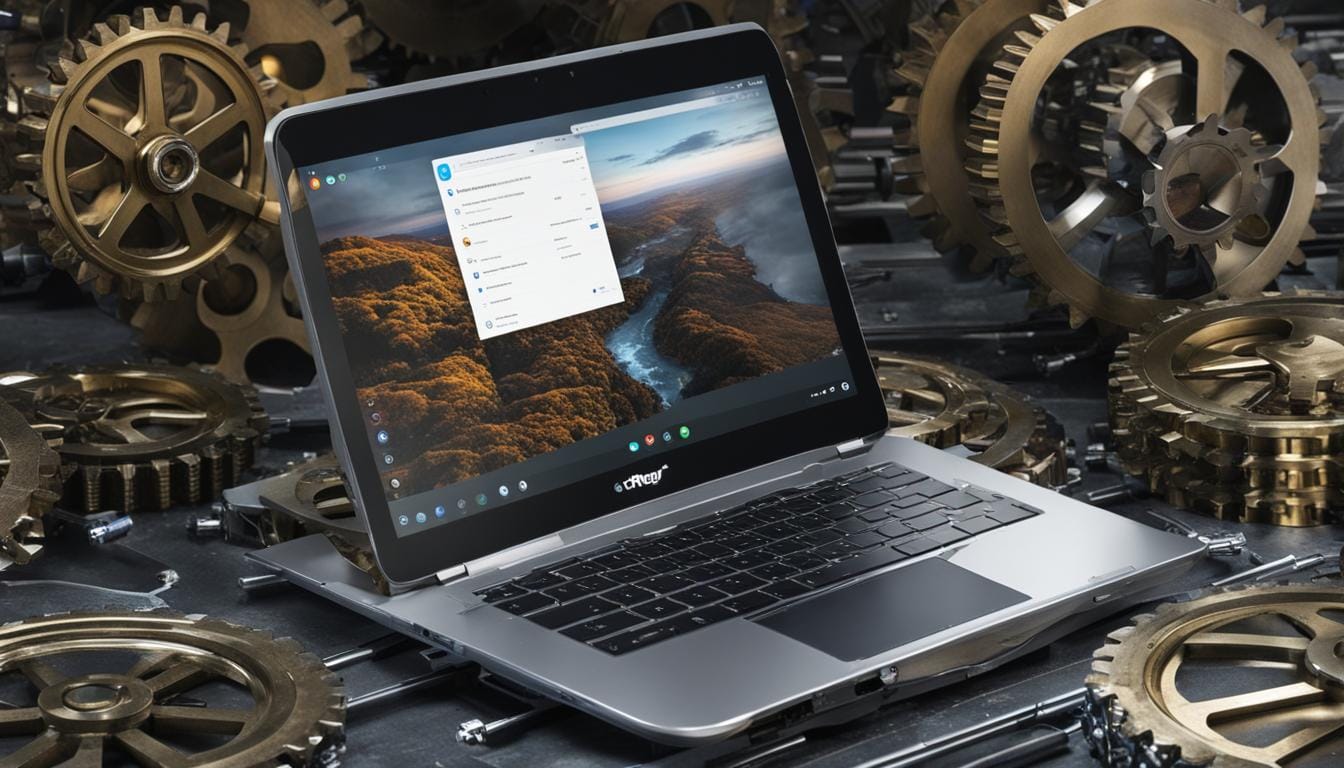If you’ve noticed that your Chromebook is running slow and laggy, you’re not alone. Many users experience this issue and wonder why their Chromebook is not performing as it should. In this article, we’ll delve into the possible causes of a slow Chromebook and provide effective troubleshooting methods to help you get back up to speed.
Before diving into the troubleshooting methods, let’s take a look at some common reasons why your Chromebook might be slowing down. Outdated software or recent updates can impact performance, as can a slow internet connection, installed extensions and apps, too many open tabs, background processes, low disk storage, or even damaged hardware. Pinpointing the exact cause is essential in finding the right solution.
Table of Contents
Key Takeaways:
- A slow Chromebook can be caused by various factors such as outdated software, slow internet connection, and low disk storage.
- Identifying the specific cause of the slowdown is crucial in implementing appropriate troubleshooting methods.
- Updating software, managing storage, and optimizing Chromebook settings are effective ways to improve performance.
- Consider a factory reset if other methods do not yield satisfactory results.
- Optimizing Chromebook storage can also help alleviate slow loading times.
Common Causes of Chromebook Slowdown
If you’re experiencing performance issues with your Chromebook, it’s essential to understand the common causes behind its slowdown. By identifying the root cause, you can implement the right fixes and enjoy a faster and smoother Chromebook experience. Let’s explore the various factors that contribute to a slow Chromebook:
1. Outdated Software or Recent Updates
Outdated software or recent updates can significantly impact the performance of your Chromebook. It’s crucial to keep your Chrome OS and applications up to date to ensure optimal functionality.
2. Slow Internet Connection
Your internet connection speed plays a vital role in determining your Chromebook’s overall performance. If you’re experiencing a slow connection, it can negatively affect browsing speed, app performance, and overall responsiveness.
3. Installed Extensions and Apps
Extensions and apps installed on your Chromebook can consume system resources and slow down performance. Too many extensions or apps running in the background can lead to a sluggish experience.
4. Too Many Open Tabs
Having an excessive number of open tabs can strain your Chromebook’s resources and impact its speed. Closing unnecessary tabs can help improve performance.
5. Background Processes
Background processes running on your Chromebook can consume system resources and cause slowdowns. Identifying and terminating resource-heavy processes can free up system resources and enhance performance.
6. Low Disk Storage
Insufficient disk storage can hamper your Chromebook’s speed and performance. When your storage space is limited, it can affect the system’s ability to run smoothly. Regularly clear out unnecessary files and free up disk space to optimize performance.
7. Damaged Hardware
In some cases, a slow Chromebook may be caused by damaged hardware components. If you’ve ruled out software-related issues, it may be necessary to seek professional assistance to diagnose and address any hardware problems.
By identifying the specific cause of your Chromebook’s slowdown, you can implement the appropriate solutions and restore its performance. Let’s move on to the next section to explore troubleshooting methods that can help speed up your Chromebook.
Troubleshooting Methods to Speed Up Your Chromebook
To improve the speed and performance of your Chromebook, there are several troubleshooting methods you can try. By following these tips, you can optimize your Chromebook’s performance and enhance your overall user experience.
1. Keep Your Chromebook Up to Date
Ensure that your Chromebook is running on the latest software version by regularly checking for and installing any available updates. Keeping your device up to date can improve its speed and performance, as updates often include bug fixes and optimizations.
2. Identify and Close Resource-Heavy Apps or Extensions
Use the Task Manager to identify any resource-heavy apps or extensions that might be causing your Chromebook to slow down. Close these applications to free up system resources and enhance performance. To access the Task Manager, press Shift + Esc or go to the Chrome menu, select “More Tools,” and then choose “Task Manager.”
3. Uninstall Unnecessary Apps and Extensions
Uninstalling unnecessary apps and extensions can help declutter your Chromebook and improve its speed. To remove unwanted apps and extensions, go to the Chrome menu, select “More Tools,” and then choose “Extensions” or “Apps.” From there, you can easily manage and uninstall any unnecessary software.
4. Clear Browsing Data
Over time, your Chromebook’s browsing data, such as cookies and cached files, can accumulate and impact its performance. Clearing this data can help speed up your Chromebook. To clear your browsing data, go to the Chrome menu, select “More Tools,” and then choose “Clear browsing data.”
5. Free Up Disk Space
Having limited disk space can slow down your Chromebook. To free up disk space, remove unnecessary files and folders, and consider transferring files to external storage or cloud services like Google Drive. By managing your storage effectively, you can optimize your Chromebook’s performance.
“By following these troubleshooting methods, you can speed up your Chromebook and enjoy a smoother user experience. Whether it’s keeping your Chromebook updated, closing resource-heavy apps, uninstalling unnecessary software, clearing browsing data, or freeing up disk space, every step contributes to optimizing your device’s performance.”
If the above methods don’t yield satisfactory results, you can consider performing a factory reset as a last resort. However, note that this will erase all data on your Chromebook, so make sure to back up important files before proceeding. A factory reset can help resolve persistent performance issues by restoring your Chromebook to its original settings.
Optimizing Chromebook Storage
One common cause of a slow Chromebook is limited storage space. When your Chromebook’s storage is full, it can significantly impact loading times and overall performance. To optimize your storage and improve your Chromebook’s speed, try the following solutions:
- Delete unnecessary files and folders: Take some time to go through your files and folders and delete anything that you no longer need. This will free up valuable storage space and help your Chromebook run more efficiently.
- Transfer files to external storage or cloud services: Consider moving some of your larger files, such as photos or videos, to an external storage device or a cloud service like Google Drive. This way, you can access them when needed without taking up precious storage on your Chromebook.
- Consider removing the Linux operating system: If you’re not actively using the Linux operating system on your Chromebook, removing it can free up a significant amount of storage space. However, be sure to do this only if you’re comfortable with the process and understand the implications.
By managing your storage effectively, you can ensure smoother performance on your Chromebook and reduce slow loading times. Take the time to declutter your device and optimize your storage to enjoy a faster and more efficient experience.
Conclusion
A slow and laggy Chromebook can significantly hinder your productivity and browsing experience. However, there’s no need to worry because you can troubleshoot and fix these issues to improve the overall speed and performance of your device.
By identifying the root causes of the slowdown, such as outdated software, excessive extensions, and low disk storage, you can take the necessary steps to rectify the situation. Start by updating your Chromebook’s software to ensure you have the latest features and improvements.
Next, optimize your Chromebook by removing unnecessary extensions, closing resource-heavy apps, and clearing your browsing data. Keeping a limited number of tabs open at a time and regularly freeing up disk space will also aid in improving performance.
If you find that your Chromebook is still running slowly even after troubleshooting, consider a factory reset as a last resort. This will restore your device to its default settings, eliminating any residual issues that may be causing the slowdown.
With these troubleshooting methods and optimization techniques, you can enhance the speed and functionality of your Chromebook. Say goodbye to frustrating lag and welcome a smoother and more efficient user experience. Take action today to troubleshoot, fix, and improve the speed of your Chromebook!
FAQ
Why is my Chromebook running slow and laggy?
There are several possible reasons for a slow and laggy Chromebook, including outdated software, a slow internet connection, too many open tabs, installed extensions and apps, background processes, low disk storage, and damaged hardware.
How can I troubleshoot a slow Chromebook?
To troubleshoot a slow Chromebook, you can start by making sure your device is up to date, checking the Task Manager to identify and close resource-heavy apps or extensions, uninstalling unnecessary apps and extensions, clearing browsing data, and freeing up disk space.
What should I do if my Chromebook has limited storage space?
If your Chromebook has limited storage space, you can optimize storage by deleting unnecessary files and folders, transferring files to external storage or cloud services like Google Drive, and considering removing the Linux operating system if you’re not using it.
When should I consider a factory reset for my Chromebook?
If other troubleshooting methods do not improve the performance of your Chromebook, you can consider a factory reset as a last resort. However, please note that this will erase all data on your device, so make sure to back up any important files before proceeding.


Leave a Reply